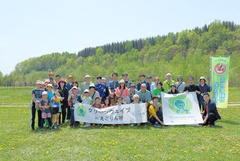"The Green Wave 2017" in Japan - Aleph sensibilisiert für Biodiversität
Japan beteiligte sich auch in diesem Jahr mit einem umfangreichen Programm an der Umweltkampagne "The Green Wave", die besonders junge Menschen anspricht. Die Restaurantkette Aleph hat mit drei ganz praktischen Aktionen mitgemacht.
Informationen zu den drei Aktivitäten in englischer Sprache:
Aleph Inc. manages about 300 restaurants all over Japan. The company had three activities registered as "The Green Wave 2017 Japan" at the "Ecorin Village". The village was constructed in 2006 for agricultural and environmental experiments and experience. Each activity was related to one of the company's three actions of biodiversity conservation through procurement.
1. Raising awareness about the problems of alien species to the native environment with the eradication of naturalized buff-tailed bumblebees.
This is because the company instructs contracted farmers not to use the alien species for cherry-tomatoes production. On the 20th of May, 36 participants attended a lecture about alien species and hunted 67 bees (59 queens and 8 workers) in one hour in the garden area where there would be a buffer zone before the Shikotus-Toya National Park. The event was staged with Hokkaido and HoBiCC, Hokkaido Environment Foundation involvement.
2. On the 3rd of June, Aleph staged a forest maintenance event such as thinning and lower grass cutting to help the diversity of the native fauna and flora.
50 participants organized mainly by OISCA (The Organization for Industrial, Spiritual and Cultural Advancement-International) Hokkaido branch joined the event. This was connected to the restaurants' use of wooden dishes using white birch trees which are not suitable for building materials. The trees are fast growers in Hokkaido where the company's headoffice is located. The activity helped participants to understand that appropriate thinning would be contributing to sustainable forestry.
3. The third activity was "transplanting baby rice plants" on the 3rd and 4th of June, led by Aleph’s private-labeled rice which is produced by using only one application of herbicide.
Many participants including children helped with the transplant which was carefully nurtured after seeding in April. This was connected with wetlands green wave and UNDB-J.

